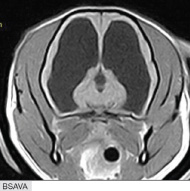MRI of Cavalier King Charles spaniel with seizures. Reproduced from BSAVA Manual of Canine Practice © BSAVA.
Researchers review more than three million electronic health records from UK veterinary practices.
An investigation into how UK primary care clinicians approach the initial management of canine generalised epileptic seizures has highlighted a number of gaps in compliance with current recommendations.
The study, published in the Journal of Small Animal Practice (JSAP), includes factors potentially associated with the prescription and choice of anti-seizure drugs.
Using the Small Animal Veterinary Surveillance Network, the authors reviewed more than three million electronic health records from over 200 veterinary practices. A total of 517 cases were included in the study, with dogs older than six years excluded.
The paper reveals that 13 per cent of the dogs received anti-seizure drugs at first presentation; the odds of administering anti-seizure drugs were about 14 times larger in dogs presented with cluster seizures.
It also shows that the most commonly selected anti-seizure drugs were imepitoin and phenobarbital. Of the dogs presenting with a single seizure and at least a six-month follow-up, 20 per cent did not have subsequent seizures recorded.
In line with International Veterinary Epilepsy Task Force recommendations, anti-seizure drugs following a single epileptic seizure were rarely prescribed. They were also only prescribed to fewer than half the dogs initially presenting with cluster seizures.
Despite no authorisation for this purpose, Imepitoin was often chosen for the treatment of cluster seizures.
Commenting on the findings, JSAP editor Nicola Di Girolamo, said: “Studies like this one are instrumental to understand how primary care clinicians comply with current recommendations. Additional efforts may be required to fully adhere to the International Veterinary Epilepsy Task Force recommendations; being aware of these gaps is the first step towards improvement.”







 The latest
The latest 
